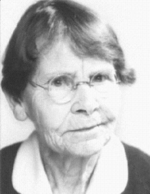Barbara McClintock
|
|
Barbara McClintock (June 16,1902-September 2,1992) was considered one of America's most distinguished cytogeneticists. She received the Nobel Prize in Physiology or Medicine in 1983 for her discovery of mobile genetic elements called transposons.
| Contents |
Biographical details
Barbara McClintock was born in Hartford, Connecticut. She received her secondary education at Erasmus Hall High School in Brooklyn, New York, and later earned B.Sc.(1923), M.A. (1925) and Ph.D. (1927) degrees from Cornell University. Women at Cornell were not allowed to major in genetics, but she became a member of an influential group studying cytogenetics in maize. McClintock was awarded several postdoctoral fellowships from the National Research Council, the Guggenheim Foundation which allowed her to continue to study genetics at Cornell, the University of Missouri, and the California Institute of Technology. She also had six months of training in Germany in 1933 - 1934. After returning from Germany early due to political tension in Europe, she remained at Cornell until 1936, when she accepted an Assistant Professorship offered to her by Lewis Stadler at the University of Missouri in the Department of Botany.
McClintock believed she would not gain tenure at Missouri and in 1941, she joined the staff of the Carnegie Institution of Washington's Department of Genetics Cold Spring Harbor Laboratory. After her year-long appointment she was offered a full-time position and she remained working at Cold Spring Harbor until her death in 1992.
Throughout her long career she held many prestigious positions and received numerous awards and Honorary Doctorates. In 1944 she became the third woman to be elected to the National Academy of Sciences and in 1945 was the first woman president of the Genetics Society of America . She was awarded the National Medal of Science by Richard Nixon in 1971. In 1981 she became the first recipient of the MacArthur Foundation Grant, and was awarded the Albert and Mary Lasker Award. Most notably, she received the Nobel Prize for Medicine in 1983, credited by the Nobel Foundation for discovering "mobile genetic elements", nearly 40 years after she initially described the phenomenon she described as controlling elements.
Scientific discoveries
While studying maize at Long Island Sound in the 1940s, she noticed distinct and regular changes in the patterns of colors of maize kernels, indicating that the genes governing these features were changing rapidly. This discovery was made before the genetic code and the DNA double helix were known, making it rather remarkable. Its importance only came to light in the late 1970's and early 1980's, nearly 40 years after the original discovery. It is now considered to be one of the roots of today's research in genetic engineering.
Less well known is her pioneering work on maize cytogenetics that led her to hypothesize the existence of telomere sequences at the end of chromosomes. Due to the high levels of DNA methylation in plants and its association with jumping genes, research in epigenetic inheritance has helped scientists understand imprinting in animals. In fact, both telomeres and epigenetics are now huge areas of interest due to the importance and relevance to animal cloning. More recently, work on gene silencing and the discovery of siRNA molecules in plants led to a whole new area of research in RNA interference (RNAi).
External links
- Barbara McClintock autobiography from the Nobel foundation (http://www.nobel.se/medicine/laureates/1983/mcclintock-autobio.html)
- Barbara McClintock biography from Cold Spring Harbor Lab (http://www.cshl.org/public/mcclintock.html)
- Evowiki entry on Barbara McClintock (http://www.evowiki.org/index.php/Barbara_McClintock)
- Public Radio commmentary on Barbara McClintock (http://www.engineerguy.com/comm/4635.htm)
- Press Release: The 1983 Nobel Prize in Physiology or Medicine (http://joklit.narod.ru/mcclintock-press.html)
Reference
- National Library of Medicine. The Barbara McClintock Papers (http://profiles.nlm.nih.gov/LL/),
Books
- Evelyn Fox Keller, A Feeling for the Organism: The Life and Work of Barbara McClintock, W. H. Freeman & Co, 1984de:Barbara McClintock
es:Barbara McClintock fr:Barbara McClintock gl:McClintok, Barbara id:Barbara McClintock ms:Barbara McClintock ja:バーバラ・マクリントック pl:Barbara McClintock pt:Barbara McClintock sv:Barbara McClintock zh:巴巴拉·麦克林托克

